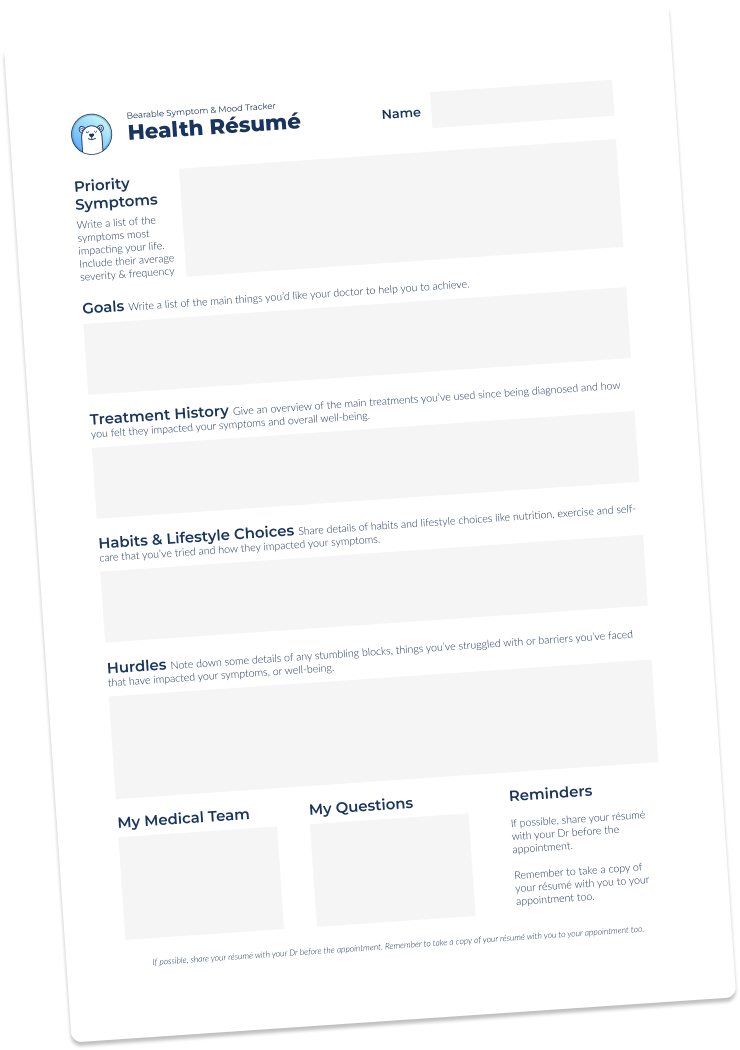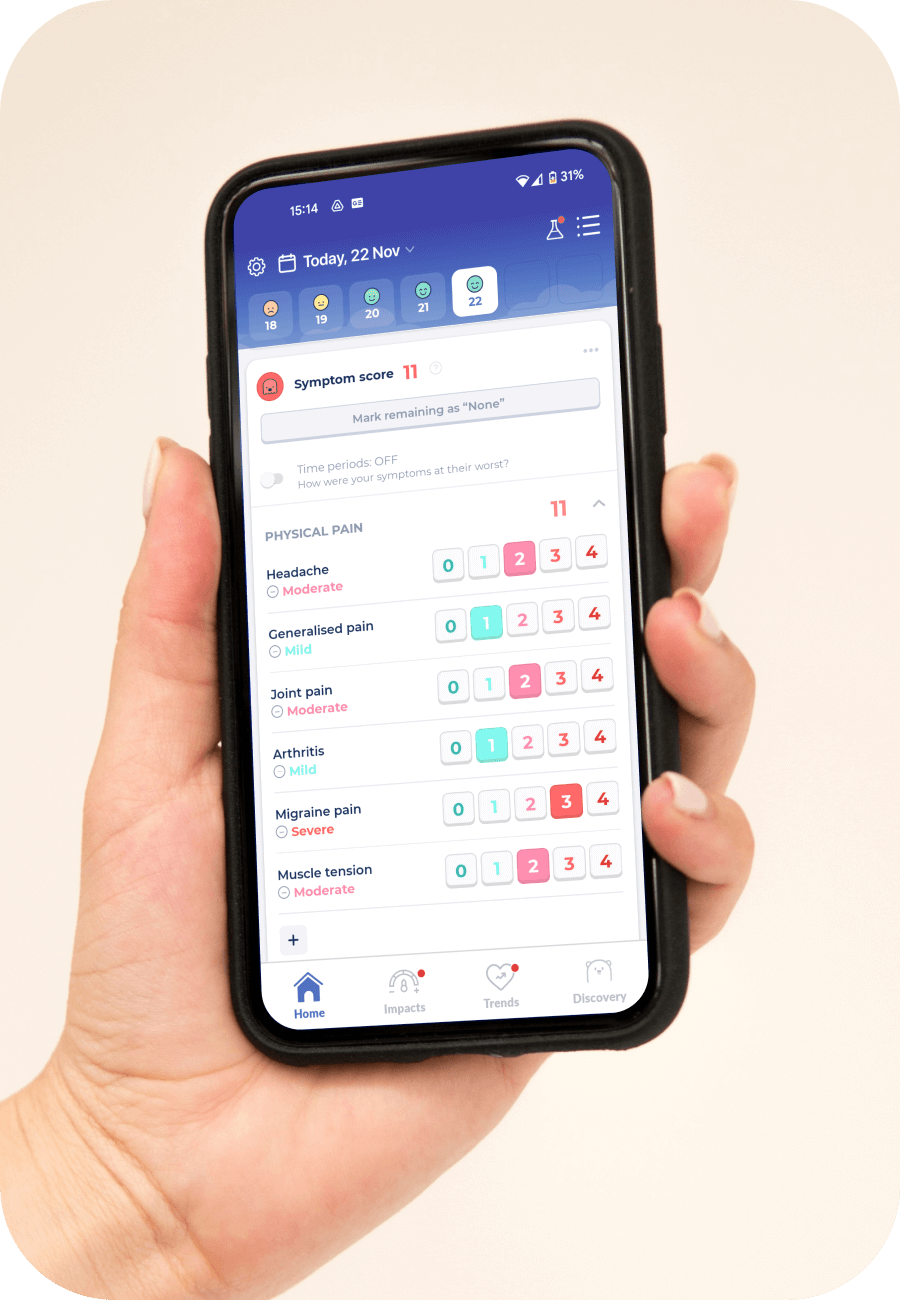
If you’ve ever felt dismissed or unheard by a doctor, you’re not alone. This page is here to support those facing medical gaslighting. Explore helpful resources, videos, and worksheets—but most importantly, read real stories from people who have overcome it. Their experiences can help you recognize the signs, make sense of your own, and feel empowered to take control of your health. Our goal is to raise awareness and give you the tools to navigate these challenges with confidence.
The stories shared on this page are real experiences of medical gaslighting experienced by people in the Bearable Community. All stories have been shared anonymously and published with their permission.
❗Trigger Warning. Some of these stories include graphic or descriptive content or content that might be distressing.

He only suggested yoga…
“I had an ER doctor diagnose me with gastritis and I lived with that for five years without anything really getting better, because it wasn’t gastritis, but no one would listen to me.
I ended up in the ER with a gallbladder that needed to come out because the pain I’d been experiencing hadn’t been gastritis, it was gallstones. One simple test, any of the times I was in the ER for gallstones, would have told them what was going on, it wasn’t until that last visit that they ran that test.
… Another doctor I saw for widespread pain that I assumed was fibromyalgia. He did diagnose me with that, but neglected to tell me he’d also diagnosed me with hypermobility, and didn’t treat me for the hypermobility, either. He only suggested yoga, which is dangerous with hypermobility. And yet another, or rather two separate psychiatrists who, only heard “anxiety and depression” and dug no further to find out I actually had ADHD and am autistic. Over a decade of psych meds that either didn’t work or made me worse, and they never listened to me when I told them that. It’s made me incredibly wary and afraid of treating both my existing conditions and any new ones. I don’t trust that I’ll be heard and respected and treated with kindness. I’ve stopped listening to/seeing doctors who refuse to listen to me. I go in armed with information, and if they’re not willing to work with me, I leave and find another doctor. I realize that looks like doctor shopping, but it’s worked for me.”

“You’ve obviously googled the symptoms”
“12 years ago after months of tests and being told I was exaggerating or they’re all just minor things, I researched and suggested perhaps I had sarcoidosis. Doctors poopoo’d but CT scans etc confirmed.
Fast forward to last year, symptoms resurfaced but my medical records were lost. A new consultant poopoo’d me, it’s just asthma, it’s just this, it’s just that, “it sounds like a misdiagnosis” or “you’ve obviously googled the symptoms if you’re imagining you have so many of them”. Finally tracked down my records and funnily enough now he agrees fully with the 12-year ago diagnosis of sarcoidosis.
…My doctor also spends the first minute welcoming me in to his office with “and you’re well, you’re feeling good, alls well, yes yes?” Which immediately makes you say yes I’m fine. When clearly you’re not or you wouldn’t be paying €70 to see him
[These experiences] undermined my confidence. The insinuation that I was imagining symptoms because I’d googled it made me not want to go back
I started being as blunt with them as I could be. ” This is an issue and I need you to address it or refer me elsewhere” and requiring copies of all files and notes at the start of the appointment so they know I will record what they say.”

I once had doctors LAUGHING at me…
“I have PCOS and a gyno told me that cysts in your ovaries don’t even hurt. That is an utter lie and they can kill you, too! I would have so much pain, it would cause spasms in my spine and my knees would go out under me. Kept falling into walls.
…I was in a hit-and-run with an 18-wheeler and fractured my spine in several places, and couldn’t walk for nearly a year. After moving to a new place and needing to find a new spinal specialist, a doctor told me that the fractures and scar tissue shouldn’t cause issues – that “pregnant women fracture their spines all the time during childbirth and don’t even notice”. As if having intense pain outshine other intense pain means you don’t feel one of them. I bet that man never even spoke to a woman after childbirth, or least, never heard her.
Every time a doctor pretends my symptoms are nothing to worry about, I find a new doctor. That doctor is (1) not hearing me and (2) not treating me. It used to do HORRIBLE things to self-esteem. I once had doctors LAUGHING at me while CRYING in pain, because they weren’t aware of the damage they were causing until test results later. Now I know better, but it still sucks to have to PROVE you’re telling the truth to a medical professional who should believe you. It makes a person defensive and doubt themselves and their own perception – it is NOT all in my head.
Therapy helped me realize that it’s not ME who needs to change. I’ve had positive interactions with medical professionals who believe me and it feels validating. Talking to others can help, because doctors do this to everyone with chronic pain and you feel less crazy when you see someone else who is obviously needing medical attention and getting the “it’s all in your head” speech and then you realize it’s not you. Oh, and every non-diabetic offers advice to diabetics without knowing a single thing about diabetes. Educating them can help sometimes, if they are willing to listen and learn, and sometimes it makes them an advocate.”

He clearly thought this was a “me” issue…
“I was 18 and exhausted. As in, sleeping 8 hours a night, and still falling asleep sitting up at work. Not other physical symptoms. Just a constant, crushing exhaustion, no matter how much I slept.
I was still seeing a pediatrician, at an office with multiple doctors. The first doctor suggested I was staying up too late and needed a schedule. I informed him I was working full time and getting enough sleep. He might have done some bloodwork? It was all normal. He clearly thought this was a “me” issue.
… I must have seen at least 4 different doctors in that practice, plus an “adult” GP. This went on for at least three years. Everyone did bloodwork. They repeated the same tests. Everything was normal. It was noted, early in this process, that my mother has sleep apnea, and so did my grandfather. No one seemed to care about that part. With sleep-based symptoms, a family history of a sleep disorder, and piles of normal bloodwork, not one single doctor thought to send me for a sleep study. A minimum of five doctors, and not one thought to do the most obvious test. I was extremely fortunate that, at the time, my insurance didn’t require a referral for me to see a specialist. So I sent myself for a sleep study, and, what do you know, I have moderate sleep apnea. I lost at least three years of my life because multiple doctors decided not to do the most obvious test. I’m still furious if I think about it for too long. That first instance alone cost me years of my life. I was sitting exhausted in a chair during parties and fell asleep during almost every movie I watched with my boyfriend. Napping a few hours after getting up. Treatment was delayed by at least three years. My confidence in doctors as a whole took a major hit. Unfortunately, that isn’t my only experience with medical gaslighting. It’s happened enough that my anxiety skyrockets before the first appointment with any new doctor, and for several appointments after that. Every doctor I see has to *earn* my trust; I don’t go in trusting that they know best, or will do their job effectively. Collectively, all the gaslighting has made me a little bit better at advocating for myself, but I shouldn’t need a “battle plan” for a doctor’s appointment. I’m now more than willing to stop seeing any doctor that downplays my symptoms or talks over me. I try to counter when doctors try dismissing something. I’ve had some wonderful doctors since then, as well as some terrible ones. I think part of it is simply that I’m older; people don’t tend to take young women seriously. I also try to see women, unless a man comes highly recommended. I’ve had great male doctors, but most of the worst were men. Younger doctors also tend to take me more seriously. I found a new primary care doctor who listens to me, is happy to refer me to specialists, and will say things like, “I don’t think that’s it, but we can check.” I found her by pure dumb luck. Now, when I need a specialist, I start by looking at the provider lists on websites related to my conditions, or ask for recommendations in support groups.”

The doctor decided I “looked normal”
“I have atypical mania. It’s severe depression mixed with racing thoughts and paranoid ideas about relationships, usually. I recognize it right away, and my family knows what it looks like for me.
One time I went to the emergency room, both my family and I agreeing that I was slipping into a manic episode. I was struggling to do basic things like eat or even brush my teeth because my thoughts were spiralling out of control.
The first doctor who saw me decided I “looked normal” and was acting normally and told me I could just go home instead of waiting for treatment.
…I’d sat in the waiting room for hours, and hadn’t been able to read a single page of my book because of how fast and obsessively my thoughts were running around and around my head. I almost gave up and went home… but I didn’t.
The next doctor who saw me believed my story and prescribed an additional medication similar to the one I was already taking.
A few weeks later, I was back to my normal self. After consultation with my family doctor, I now keep that medication in reserve for emergencies, and take it any time I start getting manic symptoms. It puts me back to rights within days. That doctor who didn’t believe me because my manic symptoms were atypical came close to preventing me from getting the treatment that has helped my condition tremendously.
This time medical gaslighting didn’t [affect me], but it could have done. That medication I was prescribed in the hospital has done wonders to keep my mind my own. If that doctor had turned me away, or if that doctor had been the one who was supposed to provide treatment, who knows how long that manic episode would have lasted without intervention, or how badly it would have disrupted my life?
I’ve found that self advocacy is really important. I could have left the hospital after the first doctor insisted there was nothing wrong, but I didn’t. Remembering that you know yourself best, and you know when you need treatment, and remembering that you deserve treatment is everything.”

Made to feel I was just being dramatic
“After years of dealing with a collection of “odd” symptoms and getting random diagnosis I finally worked up the courage to visit my primary care doctor for an autoimmune workup and referral to a rheumatologist.
When I got back in the room, the nursing assistant started to check me in and was asking a bunch of questions about my symptoms. I felt a little awkward going into depth with her, when I was going to have to do this again for the doctor, but I anxiously took out my little sticky note of symptoms and began reading them and explaining them.
… She stared at me the entire time, didn’t take notes or type what I was saying. Once I stopped over explaining myself, she looked me dead in the eyes and said “a lot of that has nothing to do with lupus.” I was so taken aback I started to over explain again and say that I wasn’t diagnosing myself I am here to figure out if the symptoms are related. She then said “well my mom had lupus and you don’t WANT lupus.” Again, shocked, I explained I did not want it and that’s not what I was here for. I started to realize what was going on and stopped explaining myself, but sat quietly getting more frustrated while she finally decided to start making notes and checking me in. Then the tears started flowing, which turned into embarrassing sobs. She must have realized she wasn’t kind, so she tried to side hug me and then sat next to me and asked me more about my symptoms and tried to tell me my life-long extreme fatigue was hormonal. It was a horrifying experience. I was mentally exhausted for days and I felt so stupid. I truly felt alone and had no idea where to turn. I’ve dealt with this treatment many times in my life, and have always been made to feel I was just being “dramatic.” Thankfully I’m in therapy, so I can work through this, but I hate to think others deal with this without mental support. I will not return to that office, but I can’t bring myself to find another PCP. The rheumatologist I saw was wonderful and everyone at his office was kind.”
Ever had a doctor brush off your symptoms or make you question your own experience? You’re not alone. Medical gaslighting is a real problem, and speaking up about it can help others feel heard, recognised, and empowered to push for better care. If you’re willing to share your story (anonymously), we’d love to hear it.
Medical gaslighting happens when doctors or other healthcare providers dismiss a patient’s symptoms, chalk them up to anxiety, or decide they aren’t worth further investigation. This can make patients second-guess their own experiences and lead to misdiagnoses, delayed treatment, or even no treatment at all.
Women, people of colour, and other marginalised groups are especially vulnerable, as biases in the medical system often mean their concerns aren’t taken as seriously. Contributing factors include rushed appointments, gaps in medical knowledge, and unconscious bias. Patients can advocate for themselves by coming prepared, clearly explaining their symptoms, and seeking second opinions when needed.
Medical gaslighting happens when doctors or other healthcare professionals dismiss a patient’s symptoms, brush them off as purely psychological, or fail to take them seriously enough to investigate further. This can make patients doubt their own experiences and lead to delayed diagnoses or improper treatment.
Women, people of colour, and other marginalized groups are especially vulnerable to this, often due to deep-rooted biases in the medical system. Several factors contribute to medical gaslighting, including rushed appointments, gaps in medical knowledge, and unconscious biases. Patients can push back by coming prepared to appointments, clearly explaining their symptoms, and seeking second opinions when necessary.
Preventing medical gaslighting requires effort from both patients and healthcare providers to improve communication and build trust.
For patients, preparation is key. Keeping a detailed record of symptoms—including when they started, how often they occur, and how they impact daily life—can provide concrete evidence during medical appointments. Writing down questions or concerns beforehand also ensures that important points aren’t forgotten in the moment.
Having a trusted friend or family member at appointments can also be helpful. They can reinforce concerns, take notes, and offer emotional support. When describing symptoms, being as clear and specific as possible makes a difference. Instead of saying, “I don’t feel well,” explaining exactly what’s happening—such as, “I’ve had severe fatigue for the past three months, and I struggle to get through a full day of work without needing to lie down”—can help doctors better understand the situation. If a doctor dismisses concerns, patients should feel empowered to ask for clarification, request further tests, or seek a second opinion if necessary.
On the healthcare side, providers play a crucial role in preventing medical gaslighting by listening to and validating their patients’ experiences. Taking the time to truly hear patients out, acknowledge their concerns, and avoid rushing to conclusions fosters a more supportive environment. Recognising and addressing unconscious biases is also essential, particularly when treating women, people of colour, and other marginalised groups who are more likely to have their symptoms dismissed.
A collaborative approach to care can make a significant difference. Explaining diagnoses and treatment options clearly, involving patients in decision-making, and respecting their input helps create a more balanced and trusting doctor-patient relationship. By prioritising open communication and empathy, both patients and healthcare providers can work toward better outcomes and a healthcare system that takes all concerns seriously.
One common example of medical gaslighting is when a doctor insists symptoms are “just stress” or “all in your head” without fully investigating other possible causes. Patients, especially women and people with chronic illnesses, often hear that their pain or fatigue is “normal” or “not that bad,” leaving them feeling unheard. Others may be told their symptoms are due to weight, anxiety, or lifestyle choices, rather than being taken seriously and properly assessed.
Some patients experience gaslighting when their doctor won’t listen to their input or refuses to order additional tests, even when symptoms persist. In more extreme cases, a provider might completely ignore a patient’s concerns, dismissing them as overreacting or being difficult. This kind of treatment not only delays diagnoses but also damages trust in the healthcare system, leaving many people feeling frustrated and helpless.
Recognizing these patterns is the first step in advocating for yourself. If a doctor isn’t listening, seeking a second opinion or keeping detailed records of symptoms can help ensure you get the care you deserve.
Individuals experiencing medical gaslighting may hear dismissive or undermining remarks from healthcare providers that cause them to question their own health perceptions.
These statements can undermine a patient’s confidence, potentially leading to delayed diagnoses or inadequate treatment.
Medical gaslighting can be subtle, but there are clear signs that your concerns aren’t being taken seriously. One major red flag is when a doctor dismisses your symptoms outright, making you feel like you’re overreacting or imagining things. If your provider repeatedly attributes your symptoms to stress, anxiety, or depression without exploring other possible causes, that’s another warning sign.
You might also notice that your doctor blames your symptoms on factors like your weight, age, or lifestyle without considering alternative explanations. Feeling unheard is another common experience—maybe they interrupt you, rush through the appointment, or seem disengaged. If you’ve asked for additional tests or a second opinion and been brushed off without a good reason, that’s a clear indicator that you may be experiencing medical gaslighting.
If any of this sounds familiar, it’s important to advocate for yourself. Keep track of your symptoms, bring a trusted friend or family member to appointments, and don’t hesitate to seek out a second opinion.
Medical Gaslighting disproportionately affects women, leading to delayed diagnoses, misdiagnoses, and a loss of trust in the medical system.
Historically, women’s health concerns have been brushed aside. The outdated concept of “hysteria” may no longer be in medical textbooks, but the mindset that women’s symptoms are overblown still lingers.
Studies have shown that women are more likely than men to have their pain and symptoms minimized, resulting in significant delays in receiving proper treatment. For example, women experiencing heart attack symptoms often have their concerns dismissed as anxiety, which can lead to life-threatening consequences.
Medical gaslighting has serious consequences. Women with conditions like endometriosis, autoimmune diseases, and heart disease are frequently ignored or misdiagnosed, sometimes for years.
This delay in care means many suffer unnecessarily, often being told their symptoms are “just stress” or “normal for women.” A significant number of women report feeling unheard by their doctors, leaving them frustrated, anxious, and sometimes even questioning their own experiences.
Why Does This Happen? Several factors contribute to the prevalence of medical gaslighting in women’s healthcare:
The best way to combat medical gaslighting is through awareness, education, and self-advocacy.
Doctors need better training to recognize and counteract bias, ensuring that all patients are treated with the same level of care and attention.
Medical research must become more inclusive, focusing on conditions that disproportionately impact women to improve diagnostic accuracy and treatment options.
Women should feel empowered to advocate for themselves—whether that means seeking a second opinion, bringing a trusted person to appointments, or keeping a detailed record of symptoms.
Medical gaslighting isn’t just frustrating—it has real consequences for women’s health. Recognizing the problem is the first step toward change, and the more awareness we bring to the issue, the closer we get to a healthcare system that listens to and respects all patients.

Fight medical gaslighting by being prepared for your next medical appointment. We created this worksheet based on the advice of a person who overcame gaslighting and was diagnosed with a chronic illness.

Brain fog or Anxiety impacting your ability to advocate in appointments? Us too! Bearable helps you tackle medical gaslighting by making sure you have a complete history of your symptoms and treatments in one place.

In 2021, we spoke with Dr Johannes Driessen about how people should address medical gaslighting from the perspective of a medical professional. TLDR: It’s okay to seek a second opinion.